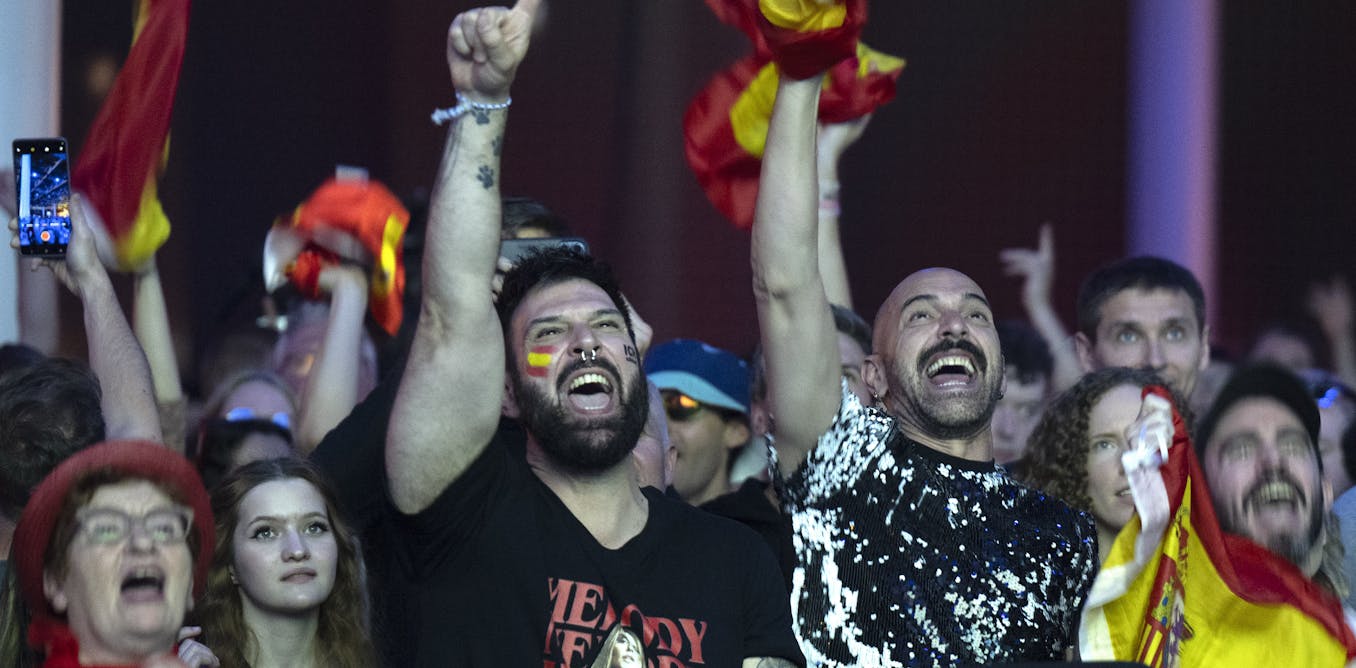Last week, Spain joined Ireland, Slovenia, Iceland and the Netherlands in announcing it will not take part in Eurovision 2026 if Israel is allowed to participate. Other countries such as Belgium and Finland have indicated they are considering withdrawing. Boycotting countries would not send an act, pay to participate or be able to vote.
Spain is one of Eurovision’s “big five” competitors. The broadcasters from Spain, the United Kingdom, Germany, France and Italy make the largest financial contributions to the contest, and their acts are guaranteed a spot in the grand final each year.
The addition of one of the big five to the boycott raises the stakes for the contest. The inclusion of Spain will likely increase the legitimacy of the protest and put pressure on countries to declare their position.
Spain’s announcement coincided with a United Nations inquiry calling the events unfolding in Gaza a genocide. In supporting the Spanish broadcaster’s decision, the country’s culture minister Ernest Urtasun equated allowing Israel to continue to compete with looking away from the atrocities being committed.
He said
if Israel takes part, and if we don’t manage to get it thrown out, then we’ll have to take steps [such as withdrawing]. I don’t think we can normalise Israel’s participation in international forums as if nothing’s happened.
Previous controversies
Germany, another of the big five, has been critical of the boycott. On Saturday, their culture minister Wolfram Weimer referred to the foundations of Eurovision, designed to unify people through song after the second world war, to argue against excluding Israel.
He said
It’s precisely because Eurovision was born on the ruins of war that it should not become a scene of exclusion.
Austria, the host for 2026, has similarly made an appeal to the peaceful and collaborative nature of the event in a plea for countries to not drop out.
However, the hosts may find themselves with an easier job if Israel does not compete. The previous two events have been marred by significant controversy. Pro-Palestinian protesters were on the streets in host cities Basel, Switzerland, in 2025, and Malmo, Sweden, in 2024, and were subject to at times violent crackdowns by police.
EPA/TIL BUERGY
In the arena, there were reports of tensions between the Israeli delegation and those from other countries, and fans tried to stage protests during the Israeli performance.
Who decides on who participates?
Israel is a member of the body that organises Eurovision, the European Broadcasting Union, an alliance of public service media organisations. Australia’s SBS is an associate member.
Broadcasters decide on who the act will be for their country (sometimes using a public vote), and help fund the event. The EBU has the final call on which countries can take part, and what songs can be performed, including demanding changes to songs deemed too political.
The EBU have pushed the deadline for countries to commit to taking part in the May 2026 competition from early October to mid-December, as it continues a consultation process with broadcasters over Israel’s inclusion.
Governments recognise the contest’s utility as a form of diplomacy, and the countries that are participating in the Eurovision boycott have all strongly criticised Israel’s actions in Gaza.
The actions of the broadcasters who have said they will boycott the event reflect their nations’ positions. National broadcasters are unlikely to ignore national policies and relationships when acting in an area like this that will attract international attention.
Russia’s removal from the 2022 contest is being used as a precedent for the EBU sanctioning a country. In announcing their decision to block Russia from participating, the EBU stated
in light of the unprecedented crisis in Ukraine, the inclusion of a Russian entry in this year’s Contest would bring the competition into disrepute.
In response, Russia has announced plans to revive the Intervision song contest, the USSR’s cold war era answer to Eurovision, further deepening a reemerging political divide.
However, using Eurovision as a sanction may be more effective with Israel. Israel’s participation in international cultural events such as Eurovision is an effort at cultural diplomacy. These platforms allow Israel to present itself as progressive and cool.
In particular, Israel’s use of queer performers at Eurovision has been criticsed as “pinkwashing” – displaying support for the LGBTQIA+ community to construct an image of tolerance and morality.
While the UN declaration that Israel is committing a genocide in Gaza already makes that image hard to maintain, condemnation from cultural institutions keeps the issue in the spotlight.
Where to for Australia?
Pressure has been building on Israel politically over the last 24 months. This week Australia recognised Palestine as a state. However, the destruction of Gaza continues, with renewed offensives on a desperate population.
Calls are beginning for Australia to join the boycott.
While this would be a decision made by SBS, which is officially independent from the government, there will be many factors influencing what they do. A boycott could create diplomatic tensions. There may also be backlash for SBS amid efforts to combat antisemitism which critics say risks conflating antisemitism with legitimate criticism of the Israeli government and constraining free speech on Gaza.
But some Australians are holding small hope that maybe SBS can show the way forward for our government and sanction Israel – even if just at a song contest.
